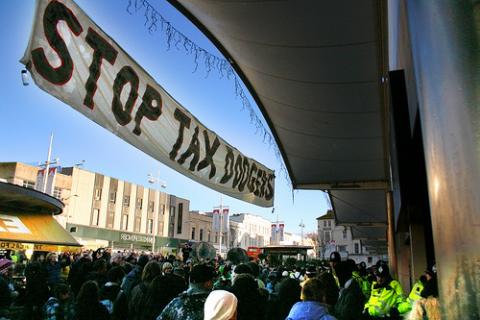Resisting austerity: the Uncut movement

The Uncut movement's message is simple: 'I pay my taxes, so why don't you pay yours?' By Ellie Mae O'Hagan.
In winter last year, I sat outside a HSBC bank for six hours in a blizzard. I was protesting against its £2bn tax avoidance. It sounds crazy, it felt crazy, but such is the life of an anti-tax avoidance protester. Sometimes it’s gruelling and tiring. Shortly after that, I was interviewed by Johann Hari for the US left-wing magazine, The Nation. Johann wrote about my snow-covered activism, and his article was read by thousands of Americans. It marked the birth of US Uncut – the American counterpart of UK Uncut, which is the umbrella name for the British anti-tax avoidance movement. Weeks later, there were demonstrations in fifty American cities. I watched in marvel as foreign strangers belted out the chants I’d been using for months. Such is the life of an anti-tax avoidance protester: sometimes it’s amazing.
People often ask how the Uncut movement works. For most of us, an organisation has a figurehead, layers of middle management, and a lot of people at the bottom that keep the wheels turning. We’re used to that in our churches, our schools, and our workplaces. So it’s unsurprising that the concept of ‘horizontalism,’ as I believe it’s now trendily called, is bamboozling for many. The best way for me to describe Uncut is to compare it to a benevolent virus. People get it, and pass it onto others they come into contact with. There’s no instruction involved: it just sort of spreads, like a really juicy piece of gossip. It started when a group of 60 activists sat down in a London Vodafone shop in October to protest against its £6bn outstanding tax bill, others saw it and copied the idea, and the rest – as they say – is history.
Thousands of people now know about Uncut. It has been praised by everyone from Michael Moore to George Monbiot, and slated by everyone from Glenn Beck to David Cameron. Incidentally, the members of UK Uncut were so proud of Glenn Beck’s condemnation that they included it in a promotional video. If you’re pissing off captain crazy, they reasoned, you must be doing something right.
As the most established arm of the Uncut movement, UK Uncut has already started seeing its efforts pay off. In March, a treasury select committee was formed to investigate corporate tax avoidance – an issue that barely even surfaced on our political landscape a year ago. The committee was formed in response to the growing public anger that resulted from UK Uncut’s protests. You can’t attend an anti-austerity demonstration in Britain now without hearing the word ‘tax avoidance’ being uttered. A banner outside Bank of America summed up popular anger quite neatly: ‘I pay my taxes, why don’t you?’
It’s unsurprising that such transformative protests have been met with attempts of censorship from governments. The most significant of these attempts was the arrest of 145 peaceful protesters in the world-famous luxury department store, Fortnum & Mason in London. After conducting a peaceful sit-in, protesters were told they would be escorted out to safety. Instead, they were contained, arrested, and held for up to twenty-four hours. Police confiscated their clothes and phones, and made some of them return home (many of them lived outside of London) wearing white overalls. Some protesters have since complained of police turning up on their doorsteps, warning them off future demonstrations.
But despite these actions from the government, the Uncut movement shows little sign of abating. In fact, its imagination and lack of leadership has lent it adaptability, which has proved useful in coping with attempts the attempts to suppress it. US Uncut’s most recent action was to team up with culture jamming activist duo, The Yes Men, to fake a press release from General Electric pledging to give back its tax rebate. The story spread across the world, forcing General Electric to uncomfortably admit that they weren’t planning on returning the money at all.
Whatever happens in Uncut’s future now, it will have succeeded in bringing tax avoidance to the attention of millions of people who had never heard of it before – people who are now facing redundancies and the loss of public services that have an improving effect upon their lives. The genie is out of the bottle, regardless of how the government deals with the movement itself. More than that – the Uncut movement is about people coming together for a better, fairer world. It is through creativity and goodwill that Uncutters have made their voices heard, and transformed political debate. As the UK Uncut blog notes in response to the treasury select committee’s investigations,
‘Occasionally people ask us what we’ve achieved and what we hope to achieve at UK Uncut. When they do, we think not only of the empowering, inspiring, creative direct actions we’ve taken, of the networks of friends and activists we’ve forged, or of the debate we’ve lit about the genuine alternatives to these unnecessary cuts. We also think of hard won political victories like the one we’ve seen today, victories which will, slowly but surely, bring about real political change.’
This article was commissioned as part of May Day International, a collaboration by New Left Project, CrisisJam, Irish Left Review, Greek Left Review and Znet. Read more here.
Image top dominicspics.
